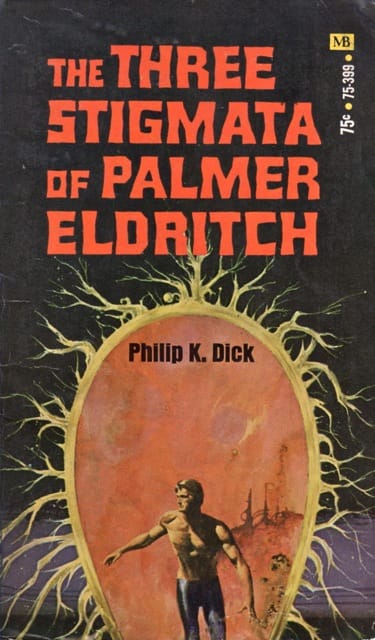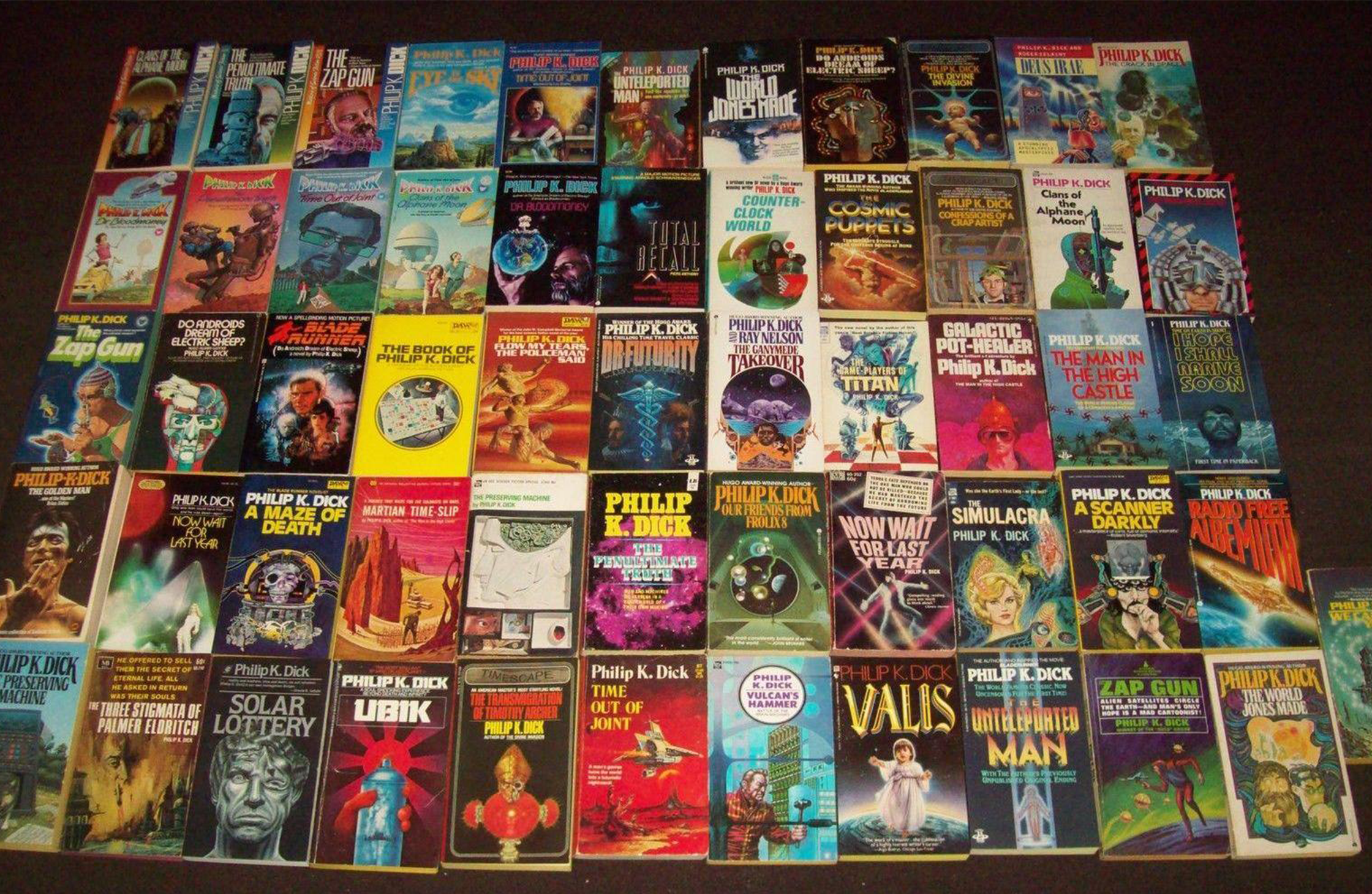Narrated by Randell Moore
Do Androids Dream of Electric Sheep?
I can’t answer that, and I doubt if Philip Kindred Dick (PKD) knew, either. We may be at the beginning stages of Artificial Intelligence, but we are a long way from a functional android. It’s a strange question about a future reality that we simply can’t answer. More specifically, what/which perception is reality? Or are our perceptions of reality merely our internal constructs, and therefore an illusion? You could try asking Alexa or Siri, or perhaps you could read Philip K. Dick’s book or watch the movie, Blade Runner. The definition of reality (or which of the alternative realities is real, if any) seems to be one of the questions that flows through PKD’s writing.
I don’t believe that the universe exists. I believe that the only thing that exists is God, and he is more than the universe. The universe is an extension of God into space and time. That’s the premise I start from in my work, the so-called ‘reality’ is a mass delusion that we’ve all been required to believe for reasons totally obscure.
In PKD’s speech at Metz in France, he discusses the alternative worlds/universes concepts occurring throughout his work. It relates to what he believes he perceived.
I, in my stories and novels, often write about counterfeit worlds, semi-real worlds, as well as deranged private worlds inhabited, often, by just one person; while, meantime, the other characters either remain in their own worlds throughout or are somehow drawn into one of the peculiar ones. This theme occurs in the corpus of my twenty-seven years of writing. At no time did I have a theoretical or conscious explanation for my preoccupation with the pluriform pseudo-worlds, but now I understand. What I was sensing was the manifold of partially actualized realities lying tangent to what evidently is the most actualized one, the one which the majority of us, by consensus gentium, agree on.
Although originally I presumed that the difference between worlds was caused entirely by the subjectivity of the various human viewpoints, it did not take me long to open the question as to whether it might not be more than that — that in fact plural I wrote out these realities did exist superimposed onto one another like so many film transparencies.
PKD's career was probably affected by the culture of the two Telegraph Hill bookstores in San Francisco. One was a science fiction, fantasy, and horror bookshop (Gaden Library Bookstore), which, with the influence of the writing class from Anthony Boucher, encouraged PKD to write science fiction that sold well. The other bookstore was an Avant Garde literary bookstore (Daliel’s Bookstore), that emphasized literary merit independent of its viability in publishing. PKD was interested in being an author recognized by the literary world but died believing he had failed to do so.

PKD wrote for both literary and popular audiences but was acclaimed for his science fiction work in his lifetime. The majority of his career was spent as a science fiction, fantasy, and horror writer who was paid very little and was in financial trouble most of the time, until just before his death when he received money for the adaptation of Do Androids Dream of Electric Sheep (aka Blade Runner). He died in 1982 from a stroke shortly before the release of Blade Runner.
PKD is one of the small number of science fiction writers (like Ray Bradbury) who are accepted in the society of mainstream authors, instead of being relegated to the fringes of science fiction, fantasy, and horror; but for PKD, this acceptance occurred only after his death.
Over his career, PKD wrote about 49 books and 152 stories. PKD also used the pseudonyms Richard Phillips and Mark Van Dyke (though sparingly). PKD knew many of the science fiction writers in the 1960s and 1970s, including Robert Heinlein, Anthony Boucher, Tim Power, James Disch, Frank Brunner, K. W. Jeter, James Blaylock, and others, primarily in the San Francisco area.
PKD had an unusual attitude toward his work, sometimes. He once contacted Venom magazine asking if he could submit a review of his own book, The Divine Invasion. Venom folded before it could be published, although it was later published in the Philip K. Dick Newsletter. I would not call it a positive review. The opening line is: “They say old dopers never die; they just write pompous novels (nobody said that? Well, they should have, because here is a case in point).”
PKD received numerous awards and nominations for awards for his work including:
- Best Novel Hugo for The Man in the High Castle in 1963
- Nominated for Best Novel Nebula for Dr. Bloodmoney and The Three Stigmata of Palmer Eldritch in 1965
- Nominated for Best Novelette Hugo for Faith of Our Fathers in 1968
- Nominated for Best Novel Nebula for Do Androids Dream of Electric Sheep in 1968
- Nominated for Best Novel Nebula for Flow My Tears, the Policeman Said in 1974
- John W. Campbell Award Winner for Flow My Tears, the Policeman Said in 1975
- Graoully d’Or winner for A Scanner Darkly in 1979
- Nominated for Best Novel Nebula for The Transmigration of Timothy Archer in 1982
Since his death, PKD has received a lot of recognition for his work. He was inducted into the Science Fiction Hall of Fame in 2005. The Philip K. Dick Award is now awarded annually for the best paperback original science fiction book each year at NORWESCON. In 2005, TIME magazine claimed that his book Ubik was one of the greatest English novels since 1928. Many of his stories and books have been adapted to movies or television, and many PKD works serve as inspiration for other works of science fiction. In addition, PKD’s works are the first science fiction novels included in The Library of America.
This article gives just a small snapshot of the author. He is recognized as one of the seminal science fiction writers of the 1960s and is recognized as a significant writer outside of the science fiction, fantasy, and horror community, as well. It is unfortunate that he did realize this acclaim during his life.
Regarding his philosophy and the underlying meaning of his stories, that is something each individual will need to assess for themselves; but remember not to take it too seriously, as PKD didn’t always take himself seriously, either. I wish you good luck in trying to understand it all, and I hope you enjoy reading PKD’s books and short stories.
References:
- Nelson, Ray. “Philip K Dick and the Two Bookstores”, The Phillip K. Dick Society Newsletter #28
- Dick, Philip K. “Review of The Divine Invasion”, The Phillip K. Dick Society Newsletter #29
Additional references:
- Grossman, Lev. “All-Time Greatest 100 Novels”, TIME
- Nichols, Peter. The Science Fiction Encyclopedia
- Smith, Curtis C. Twentieth-Century Science-Fiction Writers
- Hawk, Pat. Hawk’s Authors’ Pseudonyms II
- Ace Books. “The Science Fiction Collector, #1”
- Uwe Anton. Welcome to Reality: The Nightmares of Philip K. Dick
Steven Woolfolk is the owner of Xenophile Bibliopole & Armorer, Chronopolis Xenophilebooks.com

